The Macdonald-Laurier Institute (MLI), a neoconservative think-tank based in Ottawa, has abandoned its publicly-stated policy of disclosing its donors after receiving requests for its donor list from peace activists.
Prior to MLI’s receipt of those requests, MLI’s stated policy was to disclose its donor list to individuals who asked to see the list at MLI’s offices in Ottawa.
On July 10, after I and fellow peace activist Tamara Lorincz personally visited MLI’s Ottawa offices to request its donor list, MLI’s Director of Finance assured us, in writing, that he and his administrative team were working to prepare the requested information for us.
Four days later, he changed his tune. By email sent to Tamara and me on July 14, MLI’s Director of Finance advised us that, after consultation with MLI’s lawyers, MLI had adopted a new policy that its “donor list is confidential and cannot be released to the public”.
Why ordinary Canadians should be worried about MLI
While most Canadians might never have heard of MLI, its influence over Canadian public policy is considerable.
In its Annual Report for 2022, MLI boasts that it “dominated the national conversation in 2022”.
According to the biography of Brian Crowley, MLI’s founder and current Managing Director:
[MLI] is consistently ranked the top think tank in Ottawa… MLI has become the centre of a dynamic and diverse international group of scholars and thinkers and has established a broad range of relationships with other national think tanks in the US, UK, Germany, the Czech Republic, India, Taiwan, Japan and many other countries. MLI publishes over 300 op-eds annually in national and international media; its video viewership this year will be over 1,000,000… From 2006-08 Crowley was the Clifford Clark Visiting Economist with the Canadian federal Department of Finance, during which time he worked on a broad range of policy files and redesigned the pre-budget consultation process. This is the most senior independent advisory role on economic policy within the federal government and it carries the rank of Assistant Deputy Minister… Crowley is a frequent commentator on political and economic issues across all media and has been a columnist for numerous newspapers across Canada.
MLI uses its influence to build support for policies that are anti-worker, pro-war, and pro-fossil fuels (see here and here).
MLI’s ‘experts’ have also argued against raising taxes on the wealthy and for the creeping privatization of healthcare.
While strongly favouring increases in Canada’s already massive military spending, MLI advocates for less overall public spending.
Rich, right-wing, white men
MLI’s Board of Directors and Advisory Council are comprised predominantly of rich, right-wing, white men.
Of MLI’s thirteen Board members, eleven are men.
The Chair of MLI’s Board is Vaughn MacLellan, a senior Bay Street corporate lawyer.
MLI’s Board members include nine senior executives or Board Chairs of significant for-profit corporations. It also includes: a consultant to the pharmaceutical industry; Christian Paradis, the former Minister of Natural Resources in the Conservative government of Stephen Harper; and Big Oil heavyweight Gerry Protti, who co-founded the Canadian Association of Petroleum Producers, served for fifteen years as a senior executive of Encana Corporation and also served as Board Chair of Alberta’s captured energy ‘regulator’.
Fifteen of the sixteen members of MLI’s Advisory Council are also men.
MLI’s Advisory Council includes: three Bay Street lawyers; six individuals who serve as senior executives or as a board member of significant corporations; Richard Fadden, a former CSIS Director and National Security Adviser to Stephen Harper; and David Mulroney, Canada’s Ambassador to China under Stephen Harper. Mulroney, who headed Canada’s office in Taiwan before becoming Canada’s Ambassador to China, now spends much of his time sabre-rattling against China.
MLI enjoys charitable status
For reasons that are difficult to fathom, the Canada Revenue Agency has accorded charitable status to this gushing fountain of right-wing dogma:
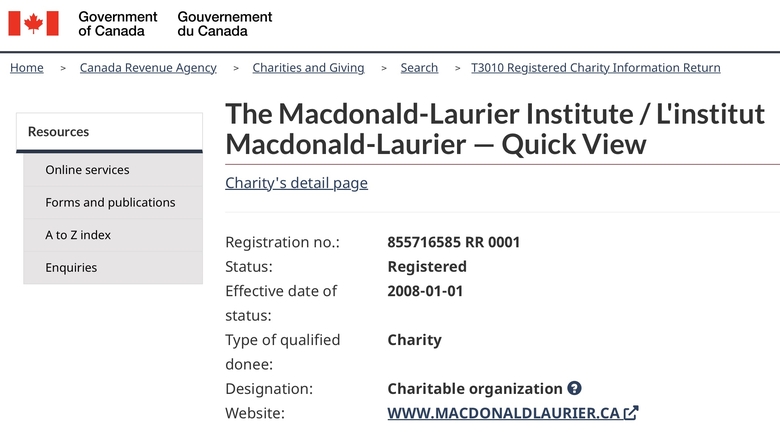
In effect, Canadian taxpayers are subsidizing an organization which promotes policies that are contrary to the interests of ordinary Canadians.
One would have thought that MLI’s wealthy benefactors possess the means to sustain MLI without taxpayer assistance, but the fat-cats who fund and run MLI are gorging at the trough of government largesse.
To conceal its donors, MLI retroactively changes its disclosure policy
At the time of the publication of this article, the latest MLI Annual Report available on MLI’s website was its 2021 Annual Report. On page 37, that Annual Report explicitly stated that “a list of donors is available on request on MLI’s offices”:
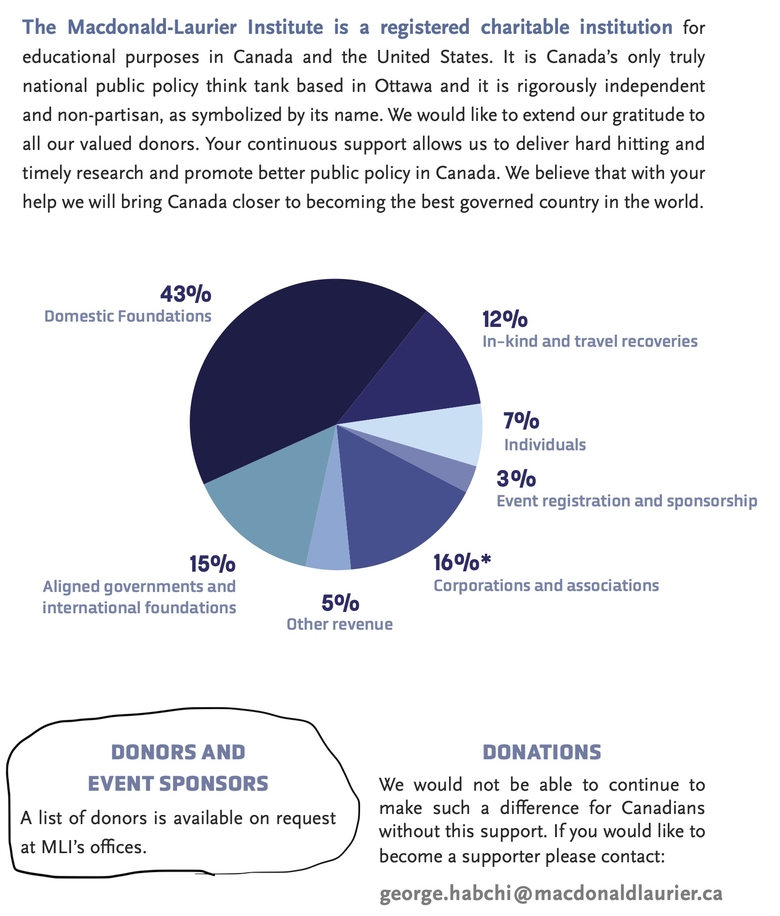
In March of this year, Tamara Lorincz, a well-known Canadian activist, personally visited MLI’s head office in Ottawa and requested to see the list of MLI’s donors.
Initially, Tamara was assured that the information would be gathered and provided to her in due course. By early July, however, Tamara had not received the donor list and MLI had stopped responding to her emails.
On July 4, I personally visited MLI’s head office in Ottawa and requested to see the list of MLI’s donors. Like Tamara, I was assured by Skander Belouizdad, MLI’s Communications Officer, that the information would be gathered and provided to me in due course.
After receiving those assurances from Belouizdad, I sent an email to Tristan Mele, MLI’s Director of Finance, to confirm what I had been told by Belouizdad:
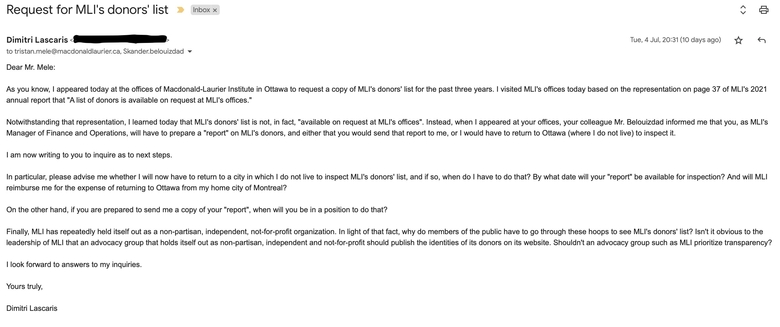
On July 10, following a further exchange of emails between Tamara, Mele and me, Mele emailed us to confirm that he was “working with my admin team and discussing a date for which we can meet and present the requested information”:

Four days later (July 14), Mele emailed Tamara and me to advise us that MLI would not provide its donor list to us, after all.
In his July 14 email, Mele asserted that MLI had altered its policy as a result of a review of MLI’s “legal and other obligations” toward its donors. Mele also claimed that that policy review had occurred over the prior year:
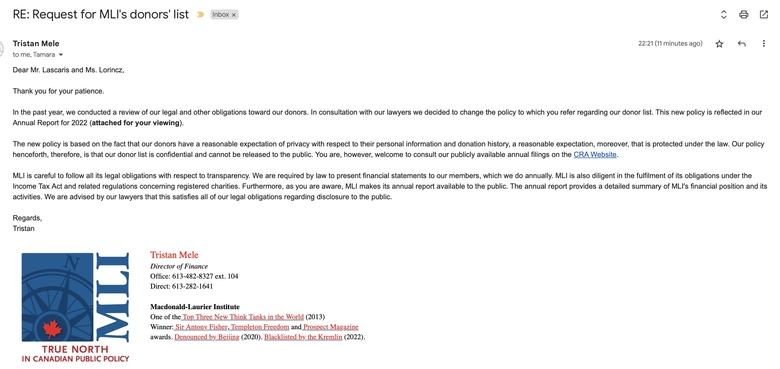
The new policy, according to Mele, was set forth in MLI’s 2022 Annual Report, which he attached to his July 14 email.
Mele did not explain, however, why the 2022 Annual Report had not been posted on MLI’s website and why the most recent Annual Report on MLI’s website was its Report for 2021.
MLI suddenly develops ‘privacy concerns’
From its founding in 2010 up to and including MLI’s fiscal year 2019, MLI’s Annual Reports included a list of corporations, associations, foundations and government agencies that donated to MLI or sponsored MLI activities during the fiscal year.
Those donor lists were not comprehensive because, as MLI explained on page 39 of its 2019 Annual Report, some of its donors had requested anonymity. Nonetheless, it is clear that many MLI donors did not object during those years to the disclosure of their identities.
For unexplained reasons, MLI stopped publishing a list of its donors in its 2020 Annual Report. At that point, MLI began to require that persons who wished to see its donor list come in person to MLI’s offices in Ottawa.
It may be that MLI became more elusive about its donors because, starting in 2020, independent media outlet The Canada Files began to subject MLI’s donors to heightened scrutiny (see, for example, here and here).
In his July 14 email, Mele explained MLI’s refusal to identify any of its donors on the following basis:
The new [MLI] policy is based on the fact that our donors have a reasonable expectation of privacy with respect to their personal information and donation history, a reasonable expectation, moreover, that is protected under the law. Our policy henceforth, therefore, is that our donor list is confidential and cannot be released to the public.
Mele’s justification for refusing to disclose MLI’s donors is simply not credible, because nothing prevents MLI from seeking the consent of its donors to the disclosure of their identities to the public. If an MLI donor were to give that consent, then MLI would incur no liability for disclosing the donor’s identity.
At no time has MLI indicated to Tamara or me that MLI had sought the consent of its donors to the disclosure of their identities or that all MLI donors had requested anonymity.
Why is this “independent” think-tank now concealing its donors?
MLI proudly declares itself to be “rigorously independent and non-partisan” (2020 Annual Report, p. 39).
This begs the central question: independent from whom?
If in fact MLI depends upon the largesse of foreign governments and/or corporate actors (whether foreign or domestic), then it can hardly claim to be “independent” of them.
Is MLI now concealing its donors from the public to preserve the fiction that it is “independent”?
From 2010 to 2019, MLI repeatedly accepted donations and sponsorships from foreign governments
A review of MLI’s donors for the years 2010 to 2019 raises serious questions as to MLI’s independence from foreign governments.
During the first decade of its existence, MLI repeatedly accepted donations and sponsorships from foreign governments (or agencies thereof). MLI’s donors and sponsors during that period included the United States, Ukrainian, Latvian, Taiwanese and Japanese governments.
Although MLI now refuses to disclose the identities of its donors, it continues to accept donations from foreign governments. MLI’s 2022 Annual Report discloses (on page 31) that eighteen percent of MLI’s 2022 donations came from “aligned governments and international foundations”. MLI explained that “aligned governments” means “liberal democratic countries that are aligned with Canada’s interests and values.” MLI does not tell us, however, which governments it considers to be “aligned” with Canada.
Does the U.S. government, which has committed war crimes and crimes against humanity with total impunity, have “interests and values” that are aligned with those of Canada? Is the United States “liberal and democratic” despite the fact that it has been ruled by two political parties throughout the entire post-WWII era, and those two parties agree on almost every issue of importance, including privatized healthcare, wildly excessive military budgets and obscenely low taxes on the rich?
If MLI were as transparent, independent and “true north” as it claims to be, not only would it tell us from which “aligned governments” it accepts funding, but it would also tell us how much funding each of those governments has given to MLI. How else are Canadians to determine the extent and nature of foreign government influence over MLI?
In April of this year, MLI senior fellow Charles Burton called for more transparency to protect Canada’s sovereignty from foreign (and particularly Chinese) government influence. In so doing, Burton argued:
Political interference scandals that have been exposed in the United Kingdom and Australia demonstrate how China operates, and that influential Canadians who curry favour with the PRC regime, by urging the federal government to implement policy toward China that favours Beijing’s interests, could be doing so out of monetary or other self-interest.
In assembling its sphere of influencers, Beijing targets occupations that retired politicians and senior civil servants tend to move to, after careers spent serving the public trust. These could be people who are compensated by the Chinese regime through board memberships or other paid associations; or who receive income from Canadian companies that do business with China; who are associated with law firms who represent Chinese firms or Canadian firms who do business with the Chinese regime; or indeed who receive income from Canadian public policy think-tanks that in turn are funded by China-associated sources such as Canadian companies who do business with the Chinese regime.
Surely Burton must know that MLI’s Board of Directors and Advisory Council include retired Canadian politicians and senior civil servants. He must also know – because it is a matter of public record – that MLI accepts funding from foreign governments. Why, then, hasn’t Burton called for greater transparency by MLI?
MLI describes itself as the “true north in Canadian public policy”, yet its reliance on foreign governments, and its refusal to disclose their identities, suggest that MLI’s public policy may not be as “true north” as it would have us believe.
From 2010 to 2019, MLI repeatedly accepted donations and sponsorships from multinational corporations
MLI’s disclosures from 2010 to 2019 also reveal that, during that period, MLI was heavily dependent upon corporate generosity. During that period, MLI repeatedly received donations and sponsorships from large fossil fuels corporations, oil & gas associations, Canada’s largest banks and the Mining Association of Canada.
MLI was awash in donations from Big Oil at the very time that its ‘independent experts’ were promoting pipelines and criticizing Canada’s carbon tax.
From 2010 to 2019, MLI also accepted numerous donations and sponsorships from the world’s largest pharmaceutical companies (or their Canadian subsidiaries), including Pfizer, Merck and Johnson & Johnson.
On March 27, 2020 – about two weeks after the World Health Organization declared a pandemic – MLI senior fellow Richard Owen authored an op-ed in which he criticized drug price controls.
After years of accepting funding from Big Pharma, could MLI’s views about drug-price controls be fairly characterized as “independent” of the pharmaceutical industry?
List of MLI’s Major Donors and Sponsors, 2010 to 2019
Based on my review of MLI’s Annual Reports for the years 2010 to 2019, I have compiled a list of the foreign governments and major corporate actors who donated to MLI or sponsored MLI during the first decade of its existence. That list appears below.
I have included in MLI’s donor list the years in which the donation or sponsorship was made.
I have also set forth below links to MLI’s Annual Reports for the years 2010 to 2021 (but not including 2012 and 2014, which I was unable to locate online but which I have obtained in hard copy).
Finally, on July 17, following my receipt of Mele’s July 14 email, I sent to Mele a series of questions about MLI’s funding. I drafted those questions in such a way that MLI could answer them without disclosing the identities of particular donors. A copy of my July 17 email to Mele appears at the end of this article. If I receive answers to my questions, I will publish those answers on this website.
Chambers of Commerce
B.C. Chamber of Commerce (2015)
U.S. Chamber of Commerce (2015, 2019)
Financial Institutions
Bank of Montreal / BMO Financial Group (2010, 2011, 2012, 2013)
CIBC / CIBC Wood Gundy (2010, 2011)
Genworth Financial (2010, 2011)
Mainstreet Equity Corporation (2010)
National Bank Financial (2018, 2019)
RBC Financial Group / RBC Foundation (2010, 2012, 2014, 2016)
TD Bank Group / TD Bank Financial Corporation (2010, 2011, 2012, 2013, 2014, 2018)
Foreign Governments and Agencies of Foreign Governments
Embassy of Ukraine (2016)
Embassy of Latvia in Canada (2017)
Embassy of Japan in Canada (2018, 2019)
Embassy of the United States (2019)
Ministry of Defence of Latvia (2017, 2018, 2019)
Taipei Economic and Cultural Office in Canada (2017, 2018)
Taiwan Foundation for Democracy (2019)
Taiwan Ministry of Foreign Affairs (2019)
Fossil Fuels Corporations and Associations
Canadian Association of Petroleum Producers (2013, 2019)
Canadian Energy Pipeline Association (2018, 2019)
Canadian Fuels Association (2011, 2012, 2013, 2014, 2015)
Canadian Gas Association (2017, 2019)
Canadian Natural Resources (2019)
Enbridge Pipelines (2018)
Encana (2011, 2012)
Imperial Oil (2014, 2018, 2019)
LNG Canada (2019)
Spectra Energy Corporation (2013, 2014, 2015, 2016)
TransCanada Pipelines (2019)
Mining Companies and Associations
Arc Resources (2013)
Mining Association of Canada (2013, 2014, 2016, 2017)
Rio Tinto Alcan (2010)
Teck Resources (2017)
Pharmaceutical Companies and Associations
AstraZeneca Canada (2011, 2017, 2019)
Canada’s Research-Based Pharmaceutical Companies (2015)
Eli Lilly Canada (2016)
Hoffmann-La Roche Limited (2019)
Johnson & Johnson (2011, 2012, 2014, 2019)
Pfizer / Pfizer Canada (2010, 2011, 2012, 2019)
Merck / Merck Canada (2010, 2011, 2012, 2014, 2017, 2018, 2019)
Pharmaceutical Research and Manufacturers of America (2011)
Weapons Manufacturers & Other Military Contractors
Lockheed Martin Canada (2017)
Lodestar Security Services (2014, 2018)
MLI’s Annual Reports
2010 Annual Report: https://www.macdonaldlaurier.ca/files/pdf/Annual-Report-2010.pdf
2011 Annual Report: https://www.macdonaldlaurier.ca/files/pdf/Annual-Report-2011.pdf
2012 Annual Report: not located online
2013 Annual Report: https://www.macdonaldlaurier.ca/files/pdf/MLIAnnualReport2013-WebReady.pdf
2012 Annual Report: not located online
2015 Annual Report: https://www.macdonaldlaurier.ca/files/pdf/MLIAnnualReport2015-WebReadyold.pdf
2016 Annual Report: https://www.macdonaldlaurier.ca/files/pdf/MLIAnnualReport2016_web_Final.pdf
2017 Annual Report: https://macdonaldlaurier.ca/files/pdf/2017_MLI_annual_report_FINALWeb.pdf
2018 Annual Report: https://macdonaldlaurier.ca/files/pdf/2018_MLI_annual_report_Fweb.pdf
2019 Annual Report: https://macdonaldlaurier.ca/files/pdf/20200515_2019_MLI_ANNUAL_REPORT_FWeb.pdf
2020 Annual Report: https://macdonaldlaurier.ca/files/pdf/20210526_2020_MLI_ANNUAL_REPORT_FWeb.pdf
2021 Annual Report: https://macdonaldlaurier.ca/wp-content/uploads/2023/03/20220603_2021_MLI_ANNUAL_REPORT_FWeb.pdf
Questions to MLI, July 17, 2023
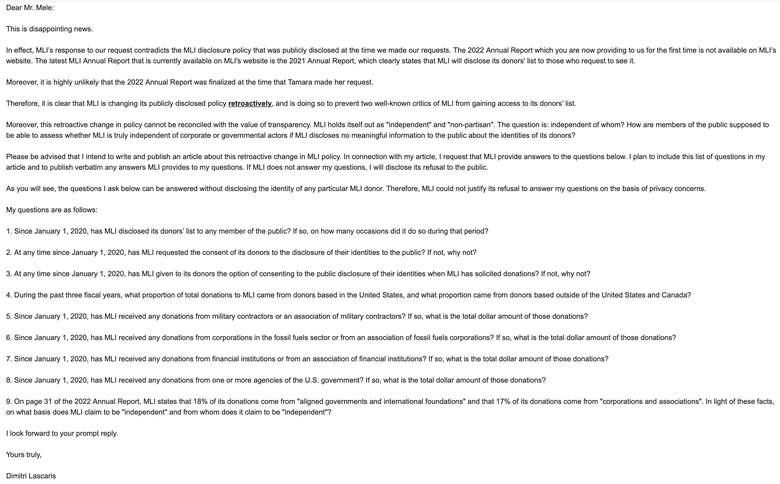
-
[…] This article was originally published on Dimitry Lascaris’ website […]





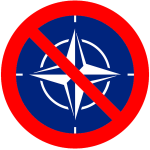
Thanks for this expose.
The “red herring” of “foreign influence” is a ridiculous concept when multinational corporations, powerful immigrant diaspora groups and foreign funded think tanks shape government policy at all levels across our country, not to mention our interlocked economy with the “elephant next door”.
The majority of Canadians are too preoccupied with debt, inflation,housing and homelessness to understand or care.
Once a great country!
If they are so proud of their work why are they so ashamed to be named? This flies in the face of any academic honesty. The pro-war bias is shameful and the purveyors of war prefer to conduct their business like all crimes under cover of darkness. Talk about the banality of evil!
None of this comes as any surprise as secrecy and lying are the operative words these days. The elites have abandoned the public they are supposed to serve and refuse to be held to account on anything.